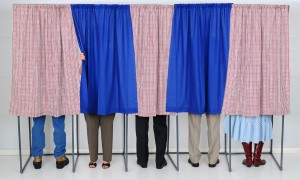Secular Americans Flexing Political Muscles in Midterm Elections
 Photo by scukrov / 123RF
Photo by scukrov / 123RF Yes, it’s that time of the year when your mailboxes get filled with campaign materials and your phones and voicemails with voting reminders. Rest assured, however, with only one week until Election Day you won’t have to put up with it for much longer.
For political junkies like me, this has been an unexpectedly interesting midterm election year. From watching Democrats around the country playing tag with President Obama, making sure they distance themselves from him, to exciting U.S. Senate races in Kentucky and Georgia where Democrats are competitive, there’s been plenty to keep my interest.
But what has been most exciting to watch, and not just because it’s my job, is the evolving relationship between religion and politics, and the increased influence secular Americans are having on the political process.
This issue has even become a topic of mainstream discussion after an episode of the CBS television show The Good Wife aired on Sunday, October 26. The shows main character, Alicia Florrick, is an out atheist running for the office of Illinois state’s attorney. She’s faced with a big interview with a religious talk show host that’s a must do for politicians in Chicago. Alicia wants to be honest and open about the issue, but her campaign consultants are telling her that she has to change her “position” on God, and at least sound like she is struggling with it. She strongly considers confirming her atheism on the talk show, but in the end, like most politicians in the real world, decides that the political calculations are more important than her personal values and integrity.
Organizations like the Freethought Equality Fund, the Secular Coalition for America, and the Center for Freethought Equality have been working hard on the issue of removing the influence of religion from politics.
The Freethought Equality Fund, the only nontheistic organization with the ability to directly contribute to political candidates, has been working to educate political leaders and consultants around the country that the electorate is becoming less religious each election cycle. And a study conducted by Gallup in 2012 showed that 54 percent of Americans now say they would vote for an atheist for president.
As this information gets out to consultants, combined with the influence that an organization like the Freethought Equality Fund can have on an election, there will be less of an inclination to sweep religion under the rug or even ask a candidate to lie about their beliefs.
Over the course of the last year, the Freethought Equality Fund has researched and endorsed some great candidates. I’m sure many of you have heard about the campaign of James Woods. What conviction he has to be the first known federal candidate to openly campaign as an atheist in a very conservative district.
What you probably don’t know is that there are eight other federal candidates running for Congress this year who identify as atheist, agnostic, humanist, or freethinker. However, they are all running in Republican-favored districts.
There’s Nick Ruiz and Gabriel Rothblatt, young progressive-minded candidates running for Congress in Florida, and Bob Goodrich and Barbara Stocker, who are running for office in Michigan and Missouri, respectively.
This really has been an exciting and groundbreaking year for humanists and other freethinkers. We have seen our influence with current members of Congress increase dramatically. We’ve also made some new friends and allies that we can hopefully call on when needed.
Political change usually always happens gradually. Are we going to elect an atheist president in 2016? Probably not. But are we setting up a sustainable foundation that will give secular Americans a continued seat at the table for years to come? We certainly are.
